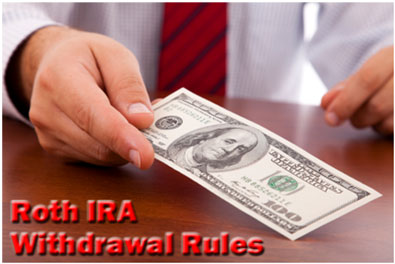 |
 |
|
|
Roth IRA Withdrawal Rules
What are the Roth IRA withdrawal rules? Can you withdraw your original contributions without penalty? And are there any exceptions to paying taxes and/or penalties on early withdrawals? It's important to know before you make any withdrawals from your account, because some withdrawals trigger taxes and/or penalties. Below is a list of the general rules you need to know concerning withdrawals:
Let's look at each of these Roth IRA withdrawal rules on an individual basis:  Withdrawal of Roth IRA ContributionsUnlike most tax-advantaged retirement accounts, you can make tax-free, penalty-free withdrawals prior to retirement age. Under IRS guidelines, you can withdraw an amount equal to or less than your original after-tax contributions at any age and under any circumstance without triggering income taxes or early withdrawal penalties. For instance, let's say you're 37 years old. You open a Roth IRA account and fund it with $5,000 in Year 1. In Year 2, you contribute an additional $5,000. By Year 3, your account is worth $11,000. But rather than making another annual $5,000 contribution, you decide that due to an emergency, you need to withdraw $5,000. In such a scenario, you can withdraw the $5,000 tax and penalty-free even though you're under age 59 ½ and your account hasn't met the 5 year rule. Why? Because you made your contributions with after-tax dollars, you've already paid taxes on your contributions. In fact, in the aforementioned scenario, you can withdraw up to $10,000 tax-free and penalty-free. But the additional $1,000 in that $11,000 account? It's subject to income taxes as well as a 10% early withdrawal penalty if withdrawn. Roth IRA 5 Year Waiting PeriodEven if you're well past age 59 ½, it's not a safe to assume that all of your Roth IRA withdrawals are tax-free and penalty-free. According to the Roth IRA withdrawal rules, you also need to meet the requirements of the Roth IRA 5 year waiting period as well. This is generally known as the 5 year rule. Under the provisions of the 5 year rule, you first need to open and fund your Roth IRA, a step which starts a ticking clock. Five tax years later (assuming you're age 59 ½ or older), you'll able to withdraw all funds from your Roth without incurring taxes or penalties. For example, let's say you open and fund a Roth IRA in 2012 at the age of 58. In 2015, you're 61 years old, and you decide to withdraw some of the investment gains from your Roth IRA. Can you do so tax-free and penalty-free? No. Although at age 61 you're older than the minimum withdrawal age of 59 ½, you still haven't met the requirements of the 5 year rule. Remember, five tax years must pass before you can take a qualified distribution. In this case, the clock started in 2012 - the tax year in which you opened and funded your Roth IRA. That starts a countdown. 2012... 2013... 2014... 2015... 2016. 2016 is the fifth tax year, so starting in 2017, all your withdrawals are tax-free and penalty-free under the Roth IRA withdrawal rules. Withdrawal of Interest and Capital GainsUnder the Roth IRA withdrawal rules, you can withdraw your original after-tax contributions without having to worry about taxes or early withdrawal penalties. But what if those contributions generated interest or capital gains? After all, that is the whole of a tax-advantaged retirement account, right? If you don't meet the 5 year rule and age requirements, then withdrawal of investment gains is most likely going to trigger an income tax liability and a 10% early withdrawal penalty. For instance, let's say you're 28 years old. A year ago, you put $4,000 in your Roth IRA, and this year it's worth $5,000. If you want to withdraw $4,000, you can do so without taxes or penalties, since it's equal to your original contribution amount. But if you wish to withdraw the full $5,000, then the $1,000 investment gain is subject to income taxes and the 10% early withdrawal penalty, leaving you with only a fraction of your overall investment gain. Withdrawals Prior to Age 59 ½Generally speaking, the Roth IRA withdrawal rules require you to reach age 59 ½ before you're eligible to withdraw investment gains tax-free and penalty-free. Of course, this assumes you've also met the requirements of the 5 year rule. Need an example? Let's say you're 55 years old. You opened and funded your Roth IRA at age 45, so you met the requirements of the 5 year rule long ago. Nevertheless, since you haven't yet reached age 59 ½, any withdrawals of your investment gains are subject to both income taxes at your current income tax rate as well as a 10% early withdrawal penalty. Withdrawals After Age 59 ½After age 59 ½, it's not so cut and dry. Withdrawals after age 59 ½ can be split into two different categories:
If you've met the 5 year rule requirements... This is the best case scenario. If you're age 59 ½ or older, and you've met the 5 year requirements for your account, then you're home free! Under the Roth IRA withdrawal rules, all withdrawals from your Roth IRA are tax-free and penalty-free for the rest of your life (assuming you don't perform any Roth IRA conversions). If you haven't met the 5 year rule requirements... Then any withdrawal of your Roth IRA investment gains will trigger both income taxes and a 10% early withdrawal penalty. Unfortunately, even though you're older than age 59 ½, you aren't completely home free until you meet the requirements of the 5 year rule. Also, make sure you keep in mind that any Roth IRA conversions are independently subject to the 5 year rule, so it's possible to fund a Roth IRA for ten years and still have a portion of your funds not meet the requirements for tax-free, penalty-free withdrawal. If this describes your situation, make sure you consult with an experienced financial planner before making withdrawals. Order of Roth IRA WithdrawalsThe Roth IRA withdrawal rules also require you to withdraw funds from your Roth IRA in the following specific order: 1) Principal contributions This is to your advantage, since you must withdraw all principal contributions before anything else. Since principal contributions are withdrawn tax-free and penalty-free, you won't owe anything (regardless of age or 5 year rule status) until you totally withdraw all of your original contributions. Withdrawals ExceptionsOf course, when it comes to the Roth IRA withdrawal rules, you can be certain of one thing - there are always exceptions. If any of the following conditions apply, your withdrawn Roth IRA investment gains are NOT subject to income taxes or an early withdrawal penalty: 1) You die and your beneficiary closes the account. 2) You become disabled according to the definition in IRS Code Section 72(m)(7) and IRS Publication 590. 3) You receive a series of "substantially equal periodic payments" based on your current life expectancy. 4) You use the withdrawn funds to pay qualified higher education expenses for either yourself and/or eligible family members. 5) You use the withdrawn funds to pay for the cost of purchasing a first home (limited to $10,000). 6) You use the withdrawn funds to pay for unreimbursed medical expenses which exceed 7 1/2% of your Adjusted Gross Income (AGI). 7) You use the withdrawn funds to pay for medical insurance premiums after receiving unemployment benefits for more than 12 weeks. 8) You use the withdrawn funds to pay back taxes due to an IRS levy placed against you. However, these are rare exceptions to the basic Roth IRA withdrawal rules. Always consult a qualified financial professional before attempting to take advantage of any one of these exceptions.
Check out our new Facebook Page and follow us on Twitter!
Return to the top of Roth IRA Withdrawal Rules Return to Roth IRA Withdrawals Return to the Your Roth IRA Website Homepage
|
What's New?Read 5 Reasons Why I Love My Roth IRA, our part in the Good Financial Cents Roth IRA Movement! Start planning ahead for next year by checking out 2017 Roth IRA contribution limits, and stay alert to this year's changes to the 2016 Roth IRA contribution limits. Our family fully funds our Roth IRA with this website. Learn how you can do it too. Are you confused or frustrated by the stock market? Learn how to build real wealth selecting individual stocks for your Roth IRA... Read more about what's new on the Roth IRA blog. Hi, I'm Britt, and this is my wife, Jen. Welcome to our Roth IRA information website! This is our humble attempt to turn a passion for personal finance into the Web's #1 resource for Roth IRA information. But, believe it or not, this site is more than just a hobby. It's a real business that provides a stable and steady stream of income for our family. In fact, because of this site, Jen is able to be a full-time stay-at-home mom and spend more time with our daughter, Samantha. But you want to know the best part? ...You can do the same thing! Anyone with a hobby or a passion (even with no previous experience building a website) can create a profitable site that generates extra income. If you're tired of solely depending on your job(s) for family income, click here now and learn why our income is increasing despite the financial crisis and how we're making our dreams come true. |
|
Search This SiteRoth IRA BasicsMore About Roth IRAsRoth IRA ResourcesAbout Your Roth IRALike Us On FacebookFollow Us On Twitter
RSSDisclaimerThe information contained in Your Roth IRA is for general information purposes only and does not constitute professional financial advice. Please contact an independent financial professional when seeking advice regarding your specific financial situation. For more information, please consult our full Disclaimer Policy as well as our Privacy Policy. Thank YouOur family started this site as a labor of love in February 2009, a few months after our daughter was born. Thank you for helping it become one of the most visited Roth IRA information sites. Thank you, too, to the "SBI!" software that made it all possible. We hope you find what you're looking for and wish you much continued success in your retirement planning! |
||
|
| ||






